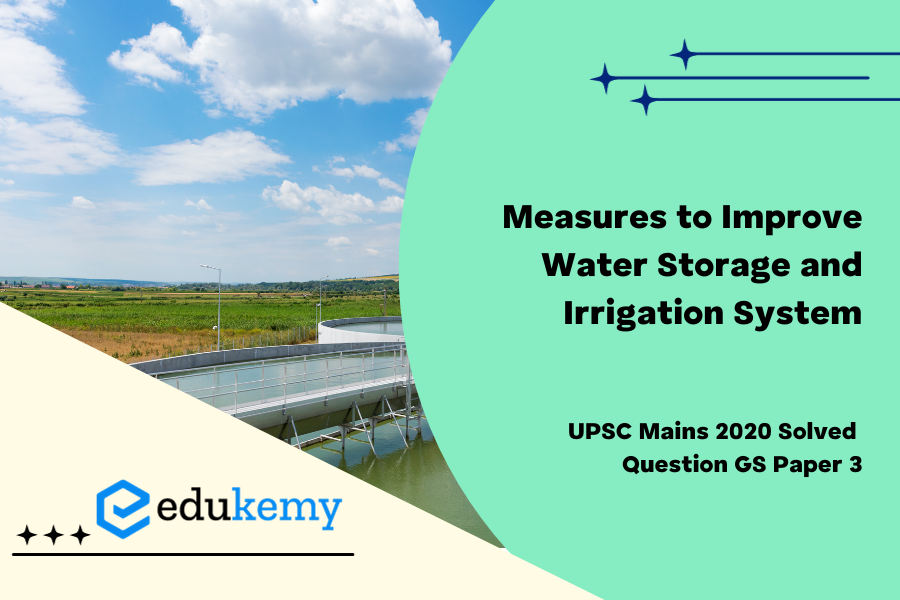
To ensure judicious use of water in depleting scenarios, enhancing water storage and irrigation systems is vital. Installing rainwater harvesting systems, building reservoirs, and adopting efficient irrigation practices are key steps. Promoting water conservation awareness, enforcing regulations, and embracing technology can aid sustainable water management.
UPSC Mains General Studies Paper – 3 Mains 2020
UPSC Mains Civil Services IAS Exam Question Paper – 2020
Contents
Approach
- In Introduction, try to give a brief description about depleting sources of water.
- In Body, discuss measures to improve water storage and irrigation for making judicious use of available water resources.
- In Conclusion, try to Conclude with SDG goals.
Answer
Introduction
India is home to 17% of the world’s population, but only holds 4% of the world’s freshwater resources. Not only is water scarce in India, but the extraction of groundwater has been on the rise for decades. India is facing one of its major and most serious water crisis. According to the Composite Water Management Index (CWMI) report, major cities in the country will reach to zero groundwater levels by 2020, affecting access for 100 million people.
Measures to improve water storage and irrigation for making judicious use of available resources:
- Reclaiming traditional water bodies: Government schemes like Mission Kakatiya by Telangana government aimed at restoring minor irrigation sources of water are examples for reclaiming water bodies using traditional ways and means.
- SWAR technology: Technologies like System of Water for Agriculture Rejuvenation (SWAR) can prove beneficial for restoring water storage and conservation. SWAR shifts irrigation from the surface to measure moisture at the plant root zone. The root zone also serves as an ecosystem to foster soil micro-organisms besides rationing plant water requirements.
- River Catchment Management: Creation of green corridors, mapping of channels for potential recharge zones to store floodwater and artificial groundwater recharge structures in the urban areas (where groundwater is five-six metres below the surface), will subsequently contribute to reducing groundwater depletion.The use of dysfunctional bore wells for recharging groundwater with clean rainwater will also be a good option.
- Rejuvenating ground water: ‘Bhungroo’ is a water management system that injects and stores excess rainfall water underground. This water is then used for irrigation during summers. This kind of practice can be adopted in urban areas where water shortages are serious.
- Wastewater Management: Dual sewage system for grey water and black water and promoting reuse of the recycled water in agriculture and horticulture should be promoted. Industries should also be encouraged to increase water use efficiency, effluent treatment and zero liquid discharge.
- Reengineering roles of grassroot level institutions: Increased role of urban local bodies and Panchayati raj institutions will help in increasing people’s participation and creating public movement for generating awareness among people regarding water storage and efficient use of irrigation methods.
- Social Regulation of Groundwater: A Participatory groundwater management approach should be followed to empower communities in a defined aquifer area by providing governance rights, community awareness, capacity development, and knowledge and motivation for social regulation of ground water and the implementation of coordinated actions.
For Improvement In Irrigation System:
- Modernization and efficient operation of the irrigation system as well as of drainage systems beyond the outlet serving 40ha blocks.
- Construction and lining of field channels and water courses.
- Land levelling and shaping.
- Construction of field drains.
- Conjunctive use of surface water and groundwater.
- Adoption and enforcement of a suitable cropping pattern according to the agro-climatic zones.
Conclusion
The changing climate and irregularity in monsoon are creating newer challenges depleting above and below ground water resources, decreasing soil moisture etc. For achieving sustainable development goals and objectives of “Jal Jeevan Mission” it is necessary to secure and conserve available water resources.
In case you still have your doubts, contact us on 8792740517.
For UPSC Prelims Resources, Click here
For Daily Updates and Study Material:
Join our Telegram Channel – Edukemy for IAS
- 1. Learn through Videos – here
- 2. Be Exam Ready by Practicing Daily MCQs – here
- 3. Daily Newsletter – Get all your Current Affairs Covered – here
- 4. Mains Answer Writing Practice – here

